Learn how to cook quail eggs, the tiny version of a chicken egg. Use them as a garnish for salads, sandwiches, and canapes, or serve them on toast.
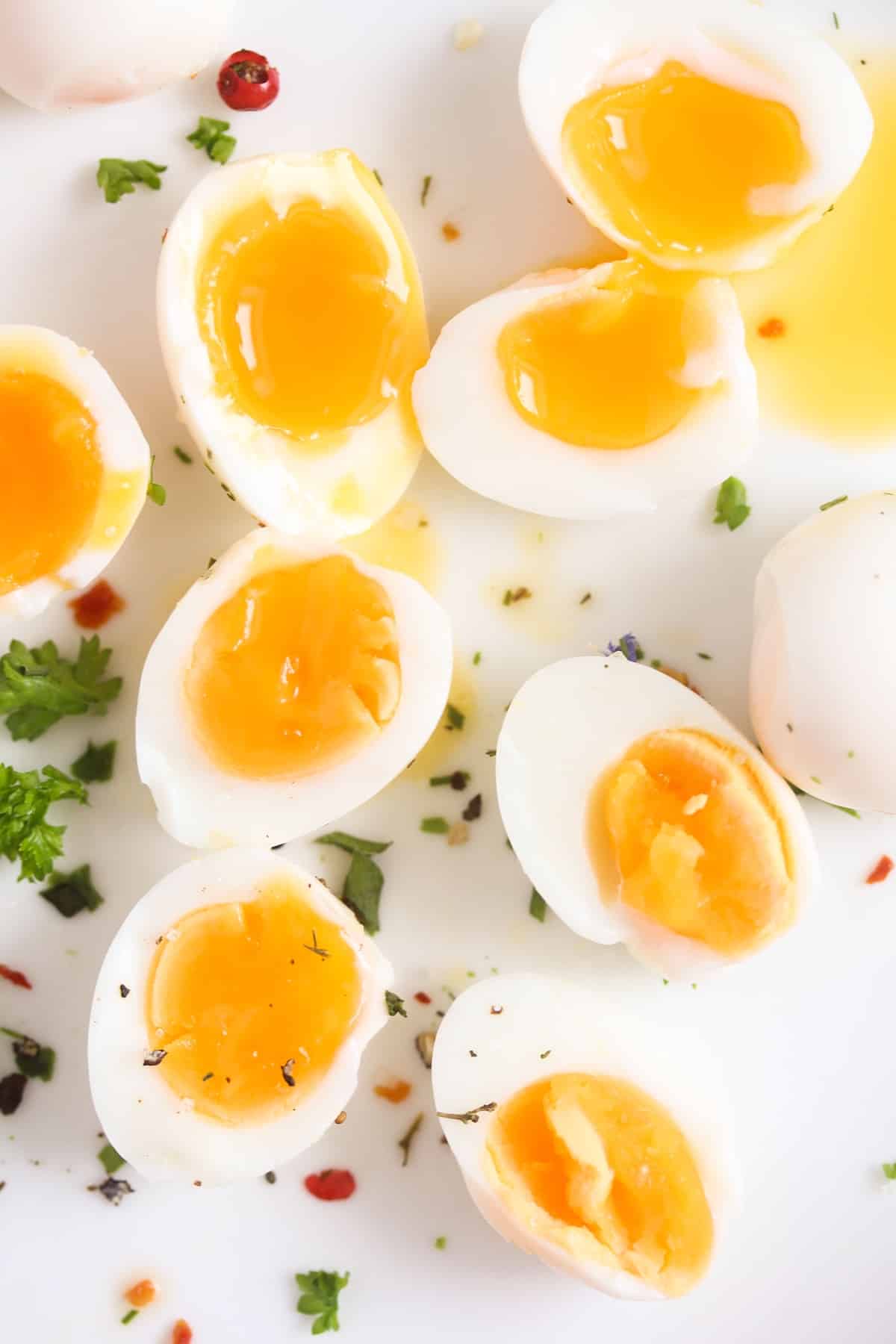
Cooking quail eggs is easy and, as you can imagine considering their size, incredibly fast. Quail eggs might not be a typical breakfast, but they are great for entertaining or for a special brunch occasionally. Learn how to boil or fry quail eggs following today’s easy tutorials.
What are quail eggs?
A quail is a small game bird from the pheasant and partridge family. They are brown and small; they are about 10-20 cm/ 4-8 inches, and they weigh between 70 and 140 g/ 2.5-5 oz. That’s why their eggs are so small compared to those of a chicken.
They are wild birds, but they are also kept as poultry birds, both for their meat and eggs.
Fresh quail eggs are considered a delicacy in many parts of the world, and buying them might not always be an easy task. However, they are becoming more popular nowadays; I usually find them in larger supermarkets.
A quail's egg is tiny; it only weighs about 9-10 g/ ⅓ oz. As a comparison, a regular chicken egg weighs about 50 g/ 1.8 oz, while duck eggs weigh about 70 g/2.5 oz. You would need about 4-5 tiny eggs to make up for one normal egg.
They are whitish cream and speckled with brown or grey spots. Their yolk is intensely yellow.
Despite their small size, they are packed with nutrients like Vitamin B12, selenium, riboflavin, choline, and iron. One piece only has 14 calories.
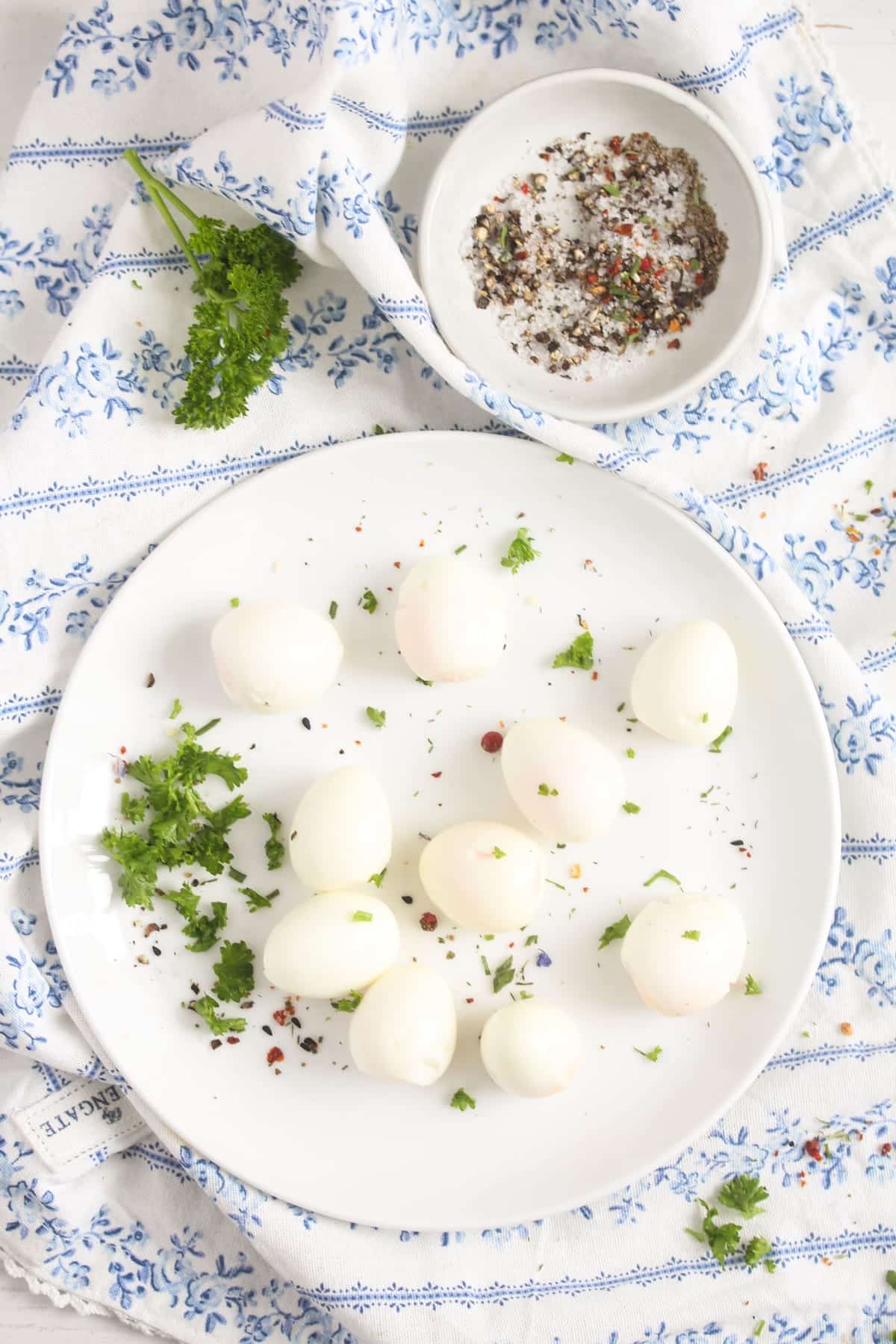
Where to buy them?
You can find them in supermarkets; the best time would probably be around a holiday season like Easter or Christmas. Nowadays, I can see them more often than that. I might have to go searching first, but eventually, I would find them.
Ideally, you would buy them directly from a farmer, which is also relatively easy in the rural area where I live.
Otherwise, you could try specialty stores, and you could probably always find them online.
The packages usually contain a dozen quail eggs.
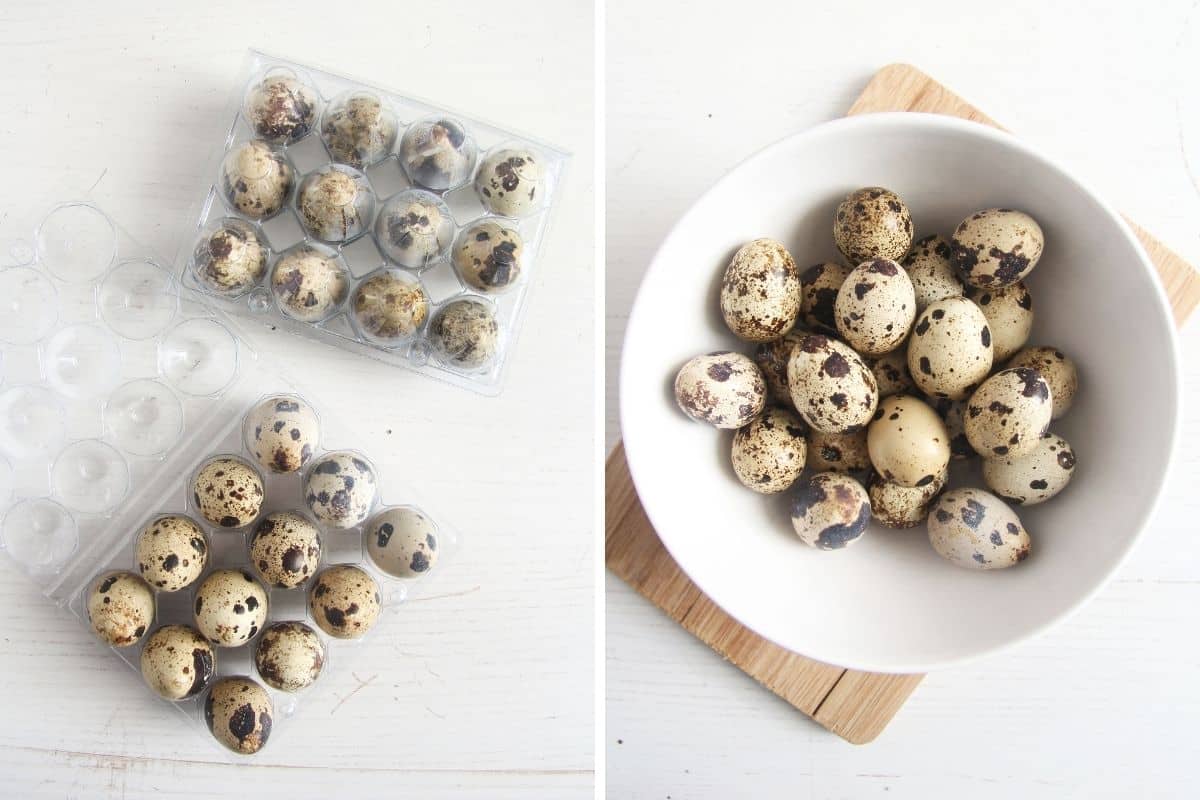
How to prepare them?
The same way you would prepare chicken eggs, just that the cooking time will be much shorter.
How to use them?
Due to their size, they are more suitable to use as a garnish or as a special treat. They are more expensive than chicken eggs, so it can be costly to cook a quail egg omelet for the family unless you farm your birds.
Expert tips
- Size and weight will make a difference when boiling them; the smaller ones will need a shorter cooking time. To get all of them cooked perfectly, you might want to divide the eggs in a package into two different batches, one containing the smaller ones and one containing the larger ones. Cook them separately or leave the larger ones a bit longer in the boiling water.
- Room temperature: They should be at room temperature before cooking. It’s not like they will cook faster this way, but the chances of breaking when you add them to the boiling water reduce.
- To bring them to room temperature, take them out of the fridge about 30-60 minutes before cooking or place them in a bowl of warm water (not hot) for about 10 minutes before cooking.
- Let the water in the pan boil gently, not rolling.
How to boil quail eggs?
You can cook them soft or hard, I prefer the soft/waxy version, but depending on how you intend to use them, you might need them to be hard-boiled.
- Bring a saucepan of water to a boil on high heat. Once the water comes to a rolling boil, turn down the heat and wait for a few seconds until it only bubbles very gently.
- Get your timer ready.
- Place them on a slotted spoon (1) and carefully lower eggs into the gently boiling water. They all need to go into the water at the same time.
- Start the timer immediately.
- Boil them as required (see below) (2).
- Cool them immediately: Carefully remove them from the water or pour the water out of the pot and run them under cold water or place them in an ice-water bath so that the cooking process will stop immediately.
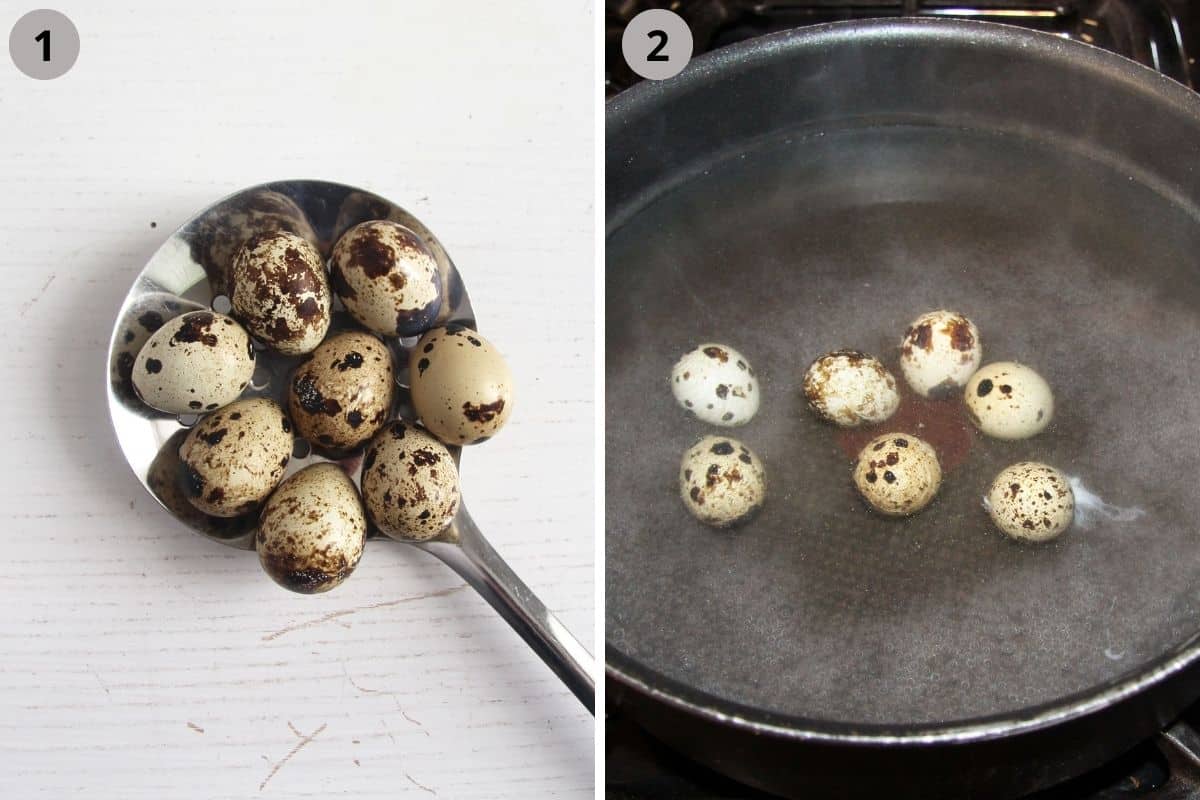
How long to boil them?
- Soft boiled: 2 minutes and 20-30 seconds or a few seconds longer if they are larger than average. You will have a runny yolk and slightly set whites.
- Medium-boiled: 3 minutes. The egg whites will be set, and the yolks will be firmer but still shiny and wet.
- Hard-boiled: 4 minutes. The yolks and whites will be set entirely.
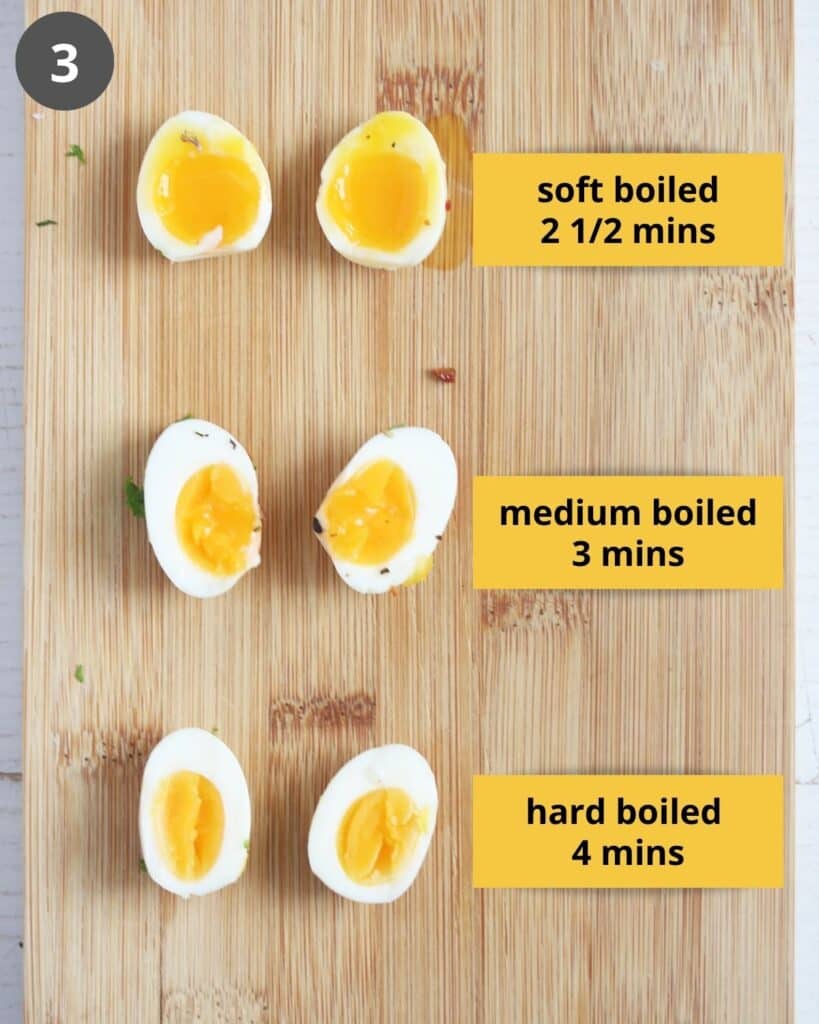
How to fry quail eggs?
- Crack each egg in a separate small bowl or small ramekin.
- Use a sharp paring knife to make a small incision into the shell and membrane beneath (4).
- Keeping your fingers safe, cut around the egg until the cut is large enough so that you can open and empty it into a small container (5).
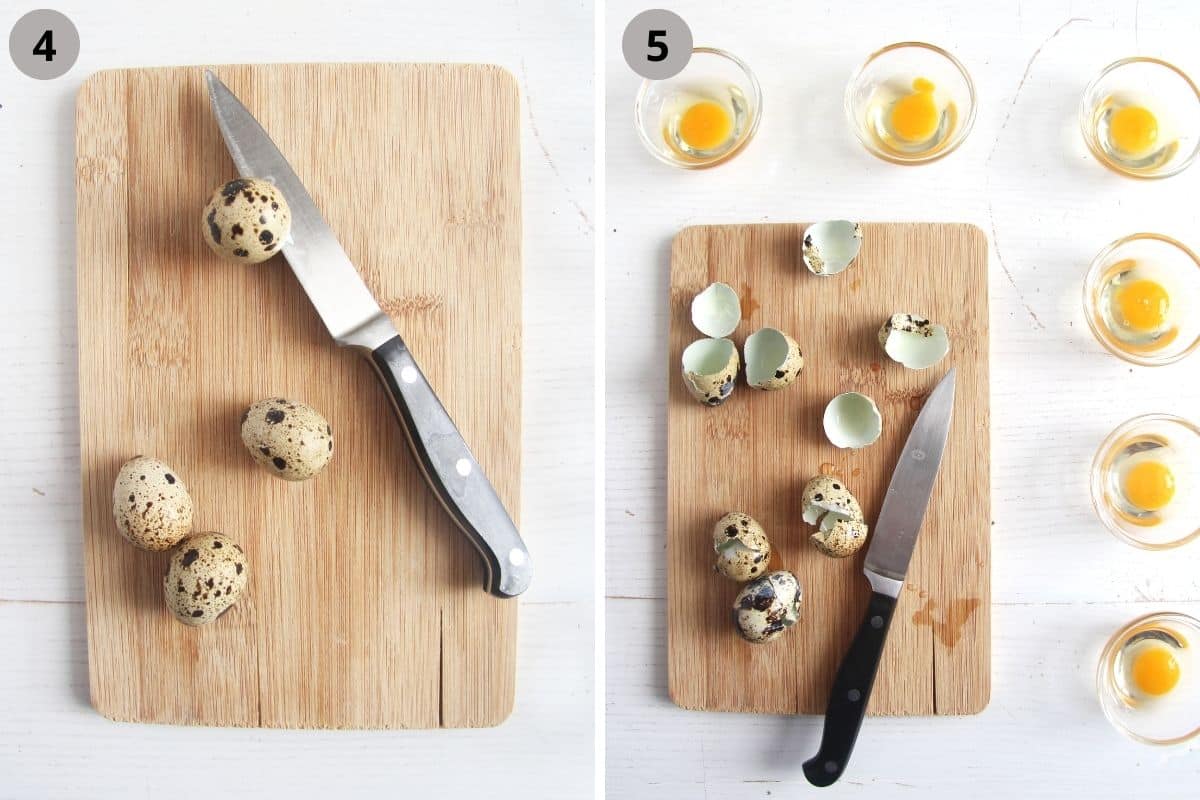
- Heat a little oil in a small or medium frying pan (I use a nonstick pan) on medium heat. Once the pan is hot, reduce heat to low.
- Carefully slide each of the raw quail eggs into the pan remembering the sequence.
- Fry them to your liking or until the whites become opaque and remove them from the pan, starting with the first one you placed into the pan (6).
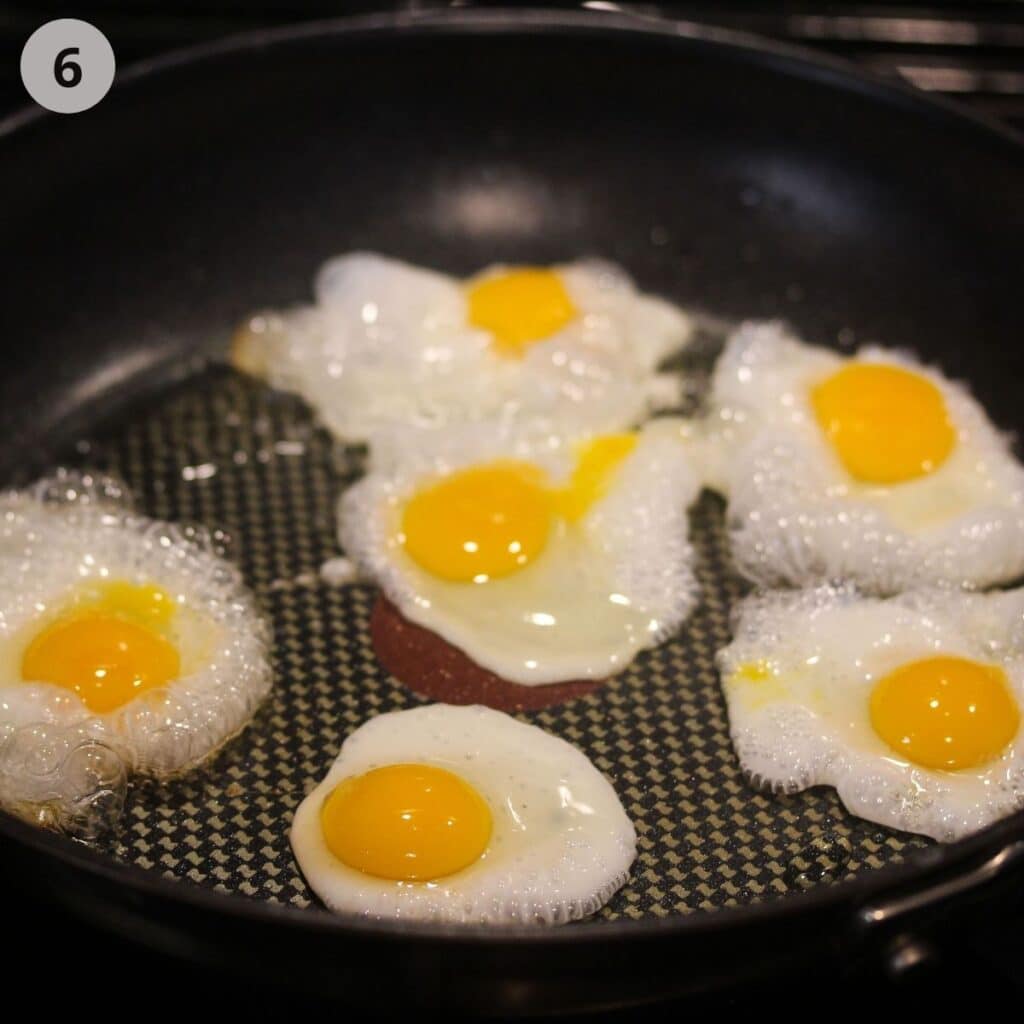
Recipe FAQ
Their shelf-life is longer than that of chicken eggs.
Room temperature: they will keep for about 1 ½ months, but always regard the "Use by date" on the package; you never know how long they were kept before you bought them.
Refrigerated, they will keep even longer, about two months. Again, please pay attention to the "Use by date" on their package.
Room temperature: No longer than 10-12 hours, even less if the weather is hot.
Refrigerator: About two days if they are soft-boiled and about one week if they are hard-boiled and the shell is intact.
No, freezing will ruin their texture.
Tap and lightly roll each one on a hard surface to crack the shell all over. Remove the shell and the membrane around each one. I prefer to start removing the shell at the top side of each piece; I find it easiest.
Work gently; if they are soft-boiled, it is more likely that some of the white will come off with the peel if you are not careful. It’s easier when they are hard-boiled.
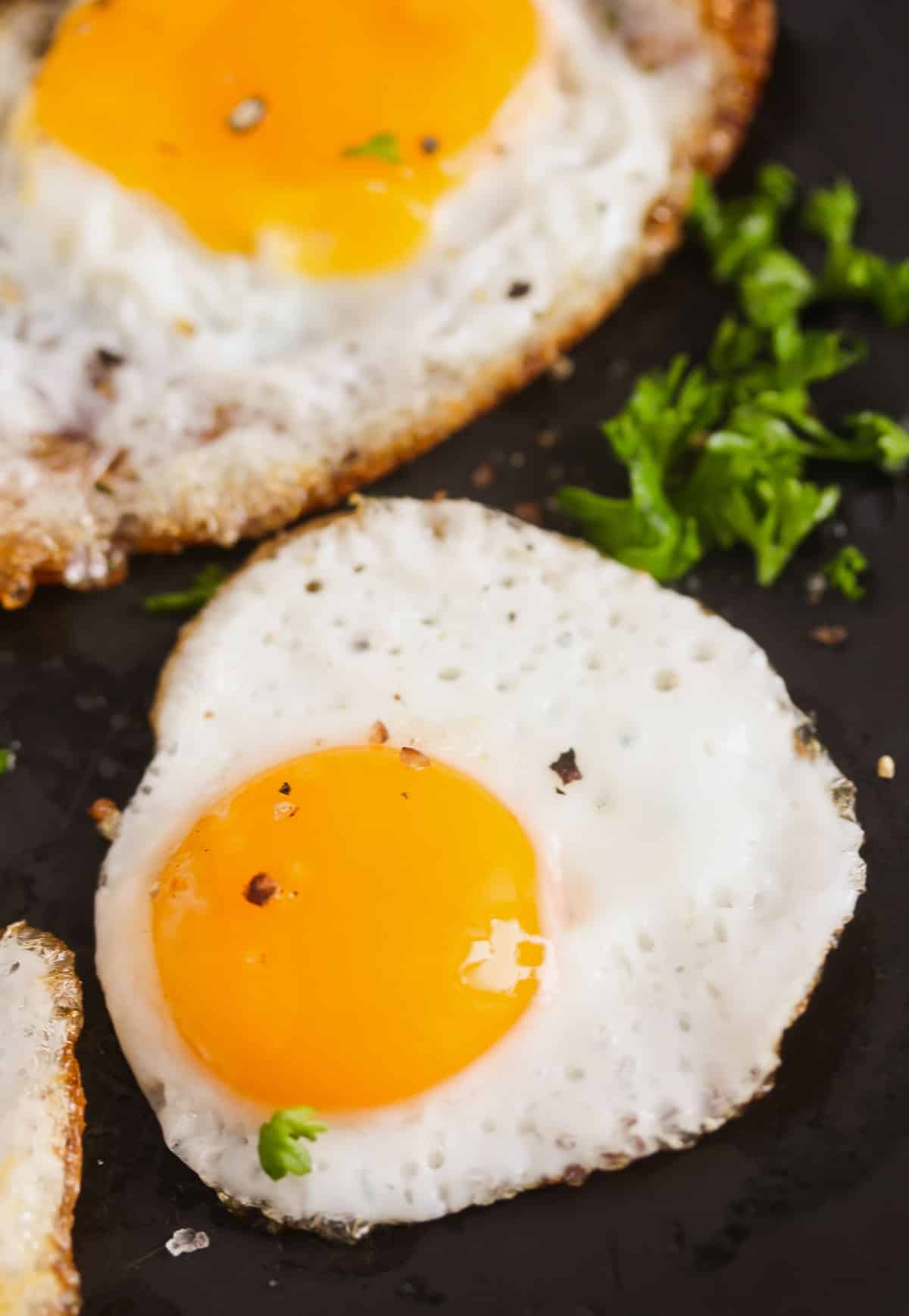
Serving suggestions
Party food: Use boiled or fried quail eggs to top canapes or smorrebrod for a party or make other small party nibbles. Sprinkle them with a small pinch of sea salt and a little black pepper. Add a dill sprig, chopped chives or parsley, and perhaps a grating of Parmesan cheese.
Mini scotch eggs are super cute and delicious. Wrap them in the ground beef coating, and deep fry them.
Breakfast or brunch: Use them to top an English muffin or sandwiches, like this Salmon Sandwich. Make Eggs and Asparagus on Toast, Garlic Mushroom Toast, or Tomatoes on Toast, and use the tiny eggs (either boiled or fried) instead of those of a chicken.
Soups: Add them to your soup plate, for instance, on top of this Spicy Tomato Soup instead of the poached egg.
Pasta: I love to add them to a simple olive oil and garlic pasta dish. They are also great with Garlic Butter Noodles or Truffle Pasta.
Salads: They are perfect on top of green salads, especially some made with arugula or lamb’s lettuce.
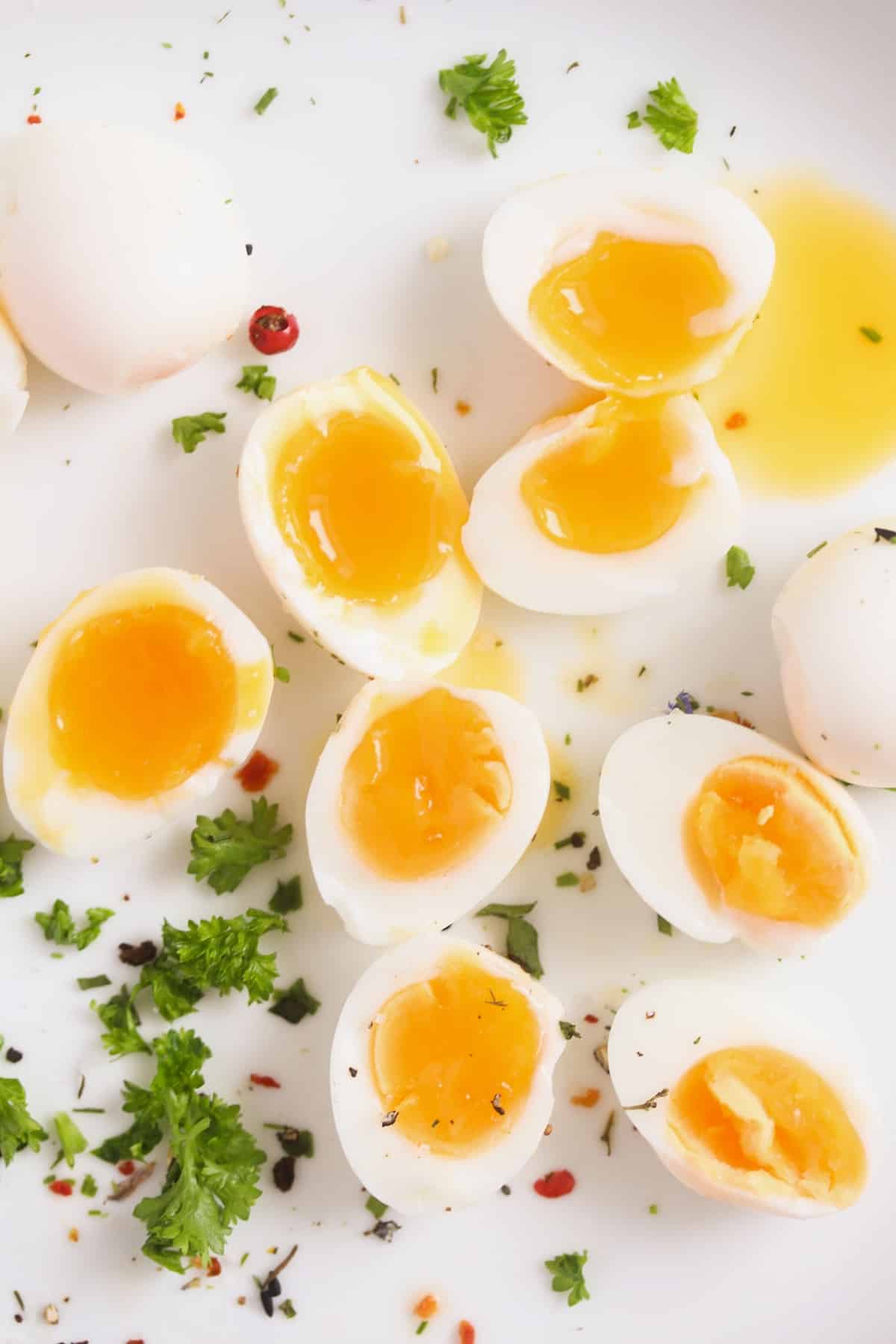
More recipes with eggs
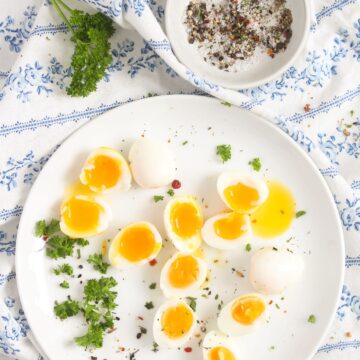
How to Cook Quail Eggs
Equipment
- 1 pan OR 1 frying pan
Ingredients
- 12 quail eggs Note 1
- Water OR 1 tablespoon vegetable oil
Instructions
Boiled quail eggs (Note 2):
- Bring a saucepan of water to a boil. Turn the heat down and wait a few seconds until the water boils only gently.
- Get your timer ready.
- Place the eggs on a slotted spoon and carefully lower them into the water. They all need to go into the water at the same time.
- Start the timer immediately.
- Soft-boiled: 2 minutes and 30 seconds; add about 10-15 for those eggs larger than the average.Medium-boiled: 3 minutes.Hard-boiled: 4 minutes.
- Cool eggs: Carefully remove them from the water or pour the water out of the pot and run the eggs under cold water or place them in a bowl with ice water so that the cooking process will stop immediately.
- Peel eggs: Tap and lightly roll each one on a hard surface to crack the shell all over. Remove the shell and the membrane around each one. I prefer to start removing the shell at the top side of the egg; I find it easier this way (Note 2).
Fried quail eggs
- Crack each egg in a separate tiny bowl or container. Use a paring knife to make a small incision into the egg. Keeping your fingers safe, cut around the egg until the cut is large enough so that you can open and empty it into a small bowl (Note 3).
- Heat a little oil in a small or medium frying pan (I use a nonstick pan).
- Carefully slide each egg into the pan remembering the sequence.
- Fry them shortly and to your liking or until the egg whites are opaque. It will not take long, about a minute.
- Remove them from the pan, starting with the first one you placed into the pan.
Notes
- To get all of them cooked perfectly, you might want to divide the eggs in a package into two different batches, one containing the smaller eggs and one containing the larger ones. Cook them separately or leave the larger ones a bit longer in the boiling water.
- Work gently; if the eggs are soft-boiled, it is more likely that some of the egg white will come off with the peel if you are not careful. It’s easier when the eggs are hard-boiled.
- Place them in separate tiny bowls or small ramekins.

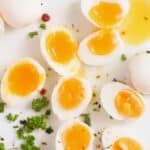
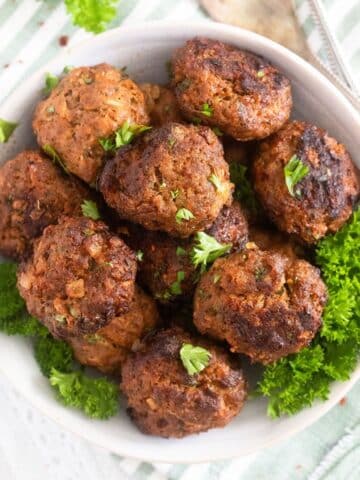
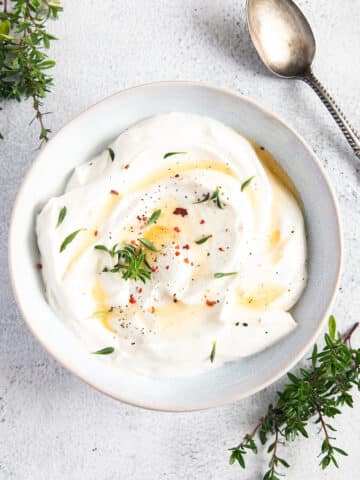
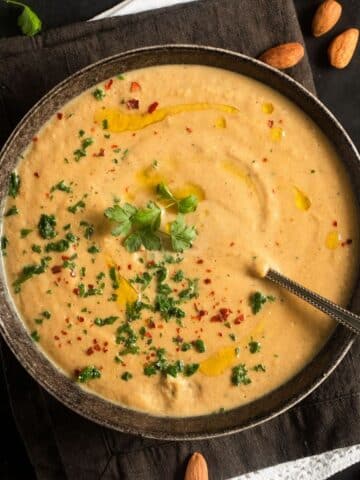
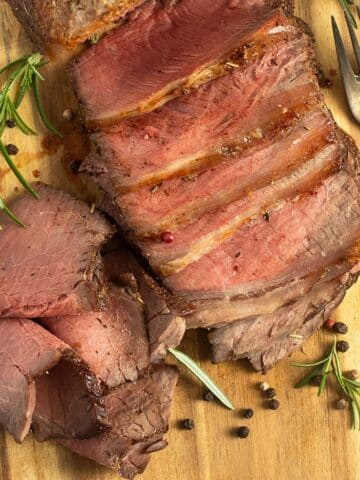

BadMedisin says
This is useful, thank you. But the nutrition section doesn’t make sense so I guess it’s incorrect. 🙂
Adina says
Hi. I am glad it helped. I googled it to check if the automatic nutrition calculator was right or wrong. Google also says that one quail egg has 14 calories, which should be right considering how tiny it is.